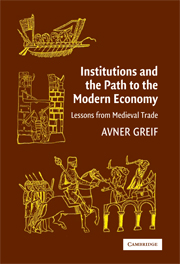Book contents
- Frontmatter
- Contents
- Abbreviations
- Preface
- I Preliminaries
- II Institutions as Systems in Equilibria
- 3 Private-Order Contract Enforcement Institutions: The Maghribi Traders' Coalition
- 4 Securing Property Rights from the Grabbing Hand of the State: The Merchant Guild
- 5 Endogenous Institutions and Game-Theoretic Analysis
- III Institutional Dynamics as a Historical Process
- IV The Empirical Method of Comparative and Historical Institutional Analysis
- V Concluding Comments
- Appendixes
- References
- Index
- POLITICAL ECONOMY OF INSTITUTIONS AND DECISIONS
4 - Securing Property Rights from the Grabbing Hand of the State: The Merchant Guild
Published online by Cambridge University Press: 05 September 2012
- Frontmatter
- Contents
- Abbreviations
- Preface
- I Preliminaries
- II Institutions as Systems in Equilibria
- 3 Private-Order Contract Enforcement Institutions: The Maghribi Traders' Coalition
- 4 Securing Property Rights from the Grabbing Hand of the State: The Merchant Guild
- 5 Endogenous Institutions and Game-Theoretic Analysis
- III Institutional Dynamics as a Historical Process
- IV The Empirical Method of Comparative and Historical Institutional Analysis
- V Concluding Comments
- Appendixes
- References
- Index
- POLITICAL ECONOMY OF INSTITUTIONS AND DECISIONS
Summary
One of the central questions about the institutional foundations of markets concerns the power of the state. The simplest economic view of the state – as an entity that enforces contracts and property rights and provides public goods – poses the following problem: a state with sufficient coercive power to do these things also has the power to withhold protection or confiscate private wealth, undermining the foundations of the market economy.
In the medieval era, before a trading center was established a ruler might pledge that foreign merchants would be secure and their rights respected. Once trade was established, however, the ruler faced the temptation to renege on his pledge – by failing to provide the promised protection or by using his coercive power to abuse the merchants' property rights. Before the emergence of the nation-state, foreign merchants could expect little military or political aid from their countrymen. Without something tangible to secure the ruler's pledge, foreign merchants were therefore not likely to frequent a trading center – an outcome that could be costly for both the ruler and the merchants. What institutions, if any, mitigated this problem?
Trade relationships between a particular merchant and ruler consist of a potentially long sequence of trading visits, during each of which the merchant may pay tax to the ruler. Intuitively, one might conjecture that a particular reputation-based institution could have enabled the ruler to commit himself.
- Type
- Chapter
- Information
- Institutions and the Path to the Modern EconomyLessons from Medieval Trade, pp. 91 - 123Publisher: Cambridge University PressPrint publication year: 2006
- 1
- Cited by



